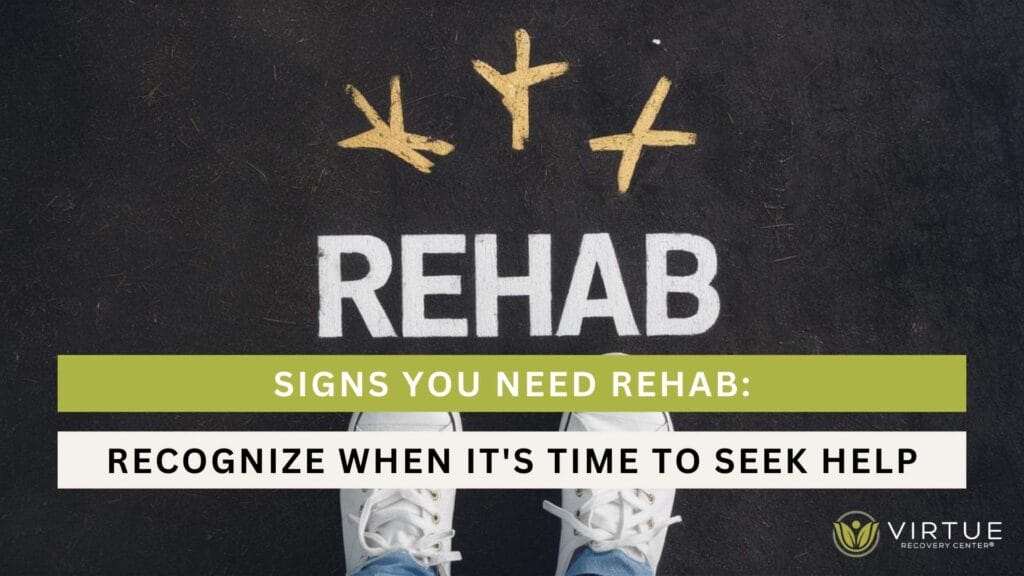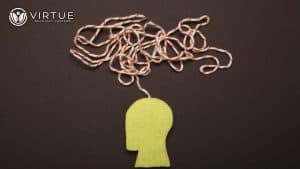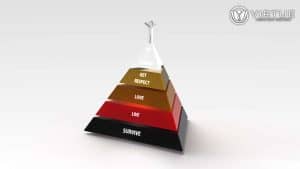Key Takeaways
- Understanding the signs of addiction: Learn to recognize the behavioral, physical, and emotional indicators.
- The importance of recognizing the need for rehab: Understand why early intervention is crucial.
- How addiction impacts your life and health: Explore the extensive effects of addiction on various aspects of life.
- Steps to take when you recognize you need help: Practical guidance on seeking support and treatment.
- Resources and support available at Virtue Recovery Chandler: Discover the comprehensive care options at Virtue Recovery Chandler.
Introduction
Addiction is a chronic disease that can take a tremendous toll on your life, affecting your health, relationships, and overall well-being. Recognizing the signs that you need rehab is a critical step in regaining control and embarking on the path to recovery. Seeking help early can make a significant difference, and Virtue Recovery Chandler is here to support you every step of the way.
Early Signs of Addiction
Identifying the early signs of addiction is essential. Behavioral changes such as increased secrecy, neglecting responsibilities, and frequent absences from work or social activities can indicate a developing problem. Physically, you might notice weight loss, changes in appearance, and withdrawal symptoms like shaking or sweating when not using the substance. Emotionally and mentally, increased irritability, anxiety, and depression are common signs that addiction is taking hold.
Understanding the Need for Rehab
Professional help is often necessary to overcome addiction. While some people attempt to manage their addiction on their own, the success rates for sustained recovery are much higher with professional treatment. Rehab provides structured support, medical supervision, and therapies that address both the physical and psychological aspects of addiction. Common misconceptions about rehab, such as it being only for severe cases, can prevent people from seeking the help they need.
How Addiction Impacts Your Life
Addiction doesn’t just affect the person using drugs or alcohol; it ripples out to impact personal relationships, job performance, and financial stability. It can cause significant strain on marriages and friendships, leading to isolation. At work, addiction often results in decreased productivity, frequent absences, and even job loss. Physically, the toll of substance use disorder includes chronic health issues such as liver disease, high blood pressure, and mental health disorders like depression and anxiety.
When to Seek Help
Recognize the Warning Signs
Frequent drug or alcohol use, especially when it starts to interfere with daily responsibilities and relationships, is a clear sign that it might be time to seek help. If you find yourself unable to stop using despite adverse consequences, this is a strong indicator of addiction.
Evaluate Your Health and Well-being
Experiencing withdrawal symptoms when not using substances, such as nausea, headaches, or irritability, signals physical dependence. A noticeable decline in overall health, such as frequent illness or deterioration in personal hygiene, can also indicate a serious problem.
Assess Your Daily Life
Neglecting responsibilities at home, work, or school due to drug or alcohol use is a major red flag. Struggles in maintaining relationships and social interactions further underscore the need for professional intervention.
Your Mental Health is Changing
Changes in your mental health, such as increased anxiety, depression, or mood swings, can be signs you may need help for drug addiction. Drug and alcohol use often exacerbates these issues, making it challenging to manage daily life. Addiction may lead to significant mental health declines, indicating the need to seek rehab. Effective treatment at a rehab or detox center can address both drug and alcohol addiction and underlying mental health conditions.
Your Physical Health is Struggling
Struggling physical health, including unexplained weight loss, fatigue, or chronic illness, can be a sign of drug and alcohol addiction. Different types of drug and alcohol use can severely impact physical well-being, requiring professional intervention. Addiction may lead to serious health complications if left untreated. Seeking rehab or drug treatment can help restore physical health and manage addiction.
You Have Considered or Tried to Quit
If you have considered or tried to quit but failed, it’s a clear sign you may need professional help for drug addiction. Compulsive drug and alcohol use often makes it challenging to stop without support. The cost of rehab can be a worthwhile investment in your health and future. Treat addiction effectively by seeking comprehensive treatment at a reputable rehab center.
You Have Placed Yourself or Others at Risk
Placing yourself or others at risk due to drug and alcohol use is a critical warning sign. Driving under the influence or engaging in dangerous behaviors are clear indicators that addiction may be taking control. Seeking rehab can help prevent further harm and provide a path to recovery. Drug and alcohol addiction requires immediate attention to avoid severe consequences.
You’re Experiencing Withdrawal
Experiencing withdrawal symptoms when you stop using drugs or alcohol is a significant sign that you need help. Alcohol withdrawal and withdrawal from other types of drugs can be dangerous and require medical supervision. Seeking rehab or detox can safely manage these symptoms and support your recovery. Professional treatment is essential to address the physical and psychological aspects of addiction.
Steps to Take When You Recognize You Need Help
Reach Out for Support
Talking to family and friends about your struggles can provide emotional support and encouragement. Healthcare professionals can offer valuable advice and referrals to treatment programs that suit your needs.
Choose the Right Treatment Program
Selecting the appropriate treatment program is crucial. Inpatient rehab offers intensive support and is ideal for those with severe addictions or co-occurring mental health conditions. Outpatient rehab provides flexibility, allowing you to continue your daily responsibilities while receiving treatment.
Prepare for Detox
Detoxification is the first step in the treatment process. Understanding what to expect during detox, including managing withdrawal symptoms with medical supervision, helps prepare you mentally and physically for the journey ahead.
Commit to Your Recovery
It is key to stay motivated throughout your recovery process. Setting achievable goals and celebrating small victories can keep you focused. Follow-up care and relapse prevention strategies are essential for maintaining long-term sobriety.
Resources and Support at Virtue Recovery Chandler
Virtue Recovery Chandler offers a range of services designed to support you through every stage of recovery. From initial assessment and detox to ongoing therapy and aftercare, our team provides comprehensive care tailored to your needs. Our treatment programs include individual counseling, group therapy, and holistic approaches to address the root causes of addiction. If you or a loved one is struggling with addiction, call us at 866-338-5779. We’re here to help you regain control and build a healthier future.
Conclusion
Recognizing the signs you need rehab is the first step toward recovery. Addiction is a chronic disease that affects every aspect of your life, but with the right help and support, you can overcome it. Early intervention, professional treatment, and a strong support system are crucial for successful recovery. If you or a loved one is struggling with addiction, don’t hesitate to reach out to Virtue Recovery Chandler at 866-338-5779. We’re here to help you every step of the way.
FAQs
What are the first signs of addiction?
The first signs of addiction often include behavioral changes, physical symptoms like weight loss or withdrawal signs, and emotional indicators such as increased anxiety or depression.
How do I know if I need to go to rehab?
If you find that drug or alcohol use is interfering with your daily responsibilities, causing health problems, or you can’t stop despite wanting to, it’s time to consider rehab.
What happens during the detox process?
During detox, your body clears itself of drugs or alcohol. This process can include withdrawal symptoms, which are managed with medical supervision to ensure safety and comfort.
How can I support a loved one who needs rehab?
Supporting a loved one involves being there for them without judgment, encouraging them to seek professional help, and providing emotional support throughout their recovery journey.
What kind of treatment programs are available at Virtue Recovery Chandler?
Virtue Recovery Chandler offers inpatient and outpatient treatment programs, including detox, individual and group therapy, and holistic approaches tailored to each individual’s needs.
Can my family make me go to rehab?
Your family cannot legally force you to go to a rehab program unless you are a minor or under a court order. However, they can strongly encourage and support you in seeking addiction treatment at a rehab center to address drug or alcohol addiction.
How long is the rehab process?
The length of a rehab treatment program varies depending on the individual’s needs and the severity of their substance abuse. Programs can range from 30 days to several months, with some treatment centers offering extended care for more intensive addiction treatment.
Are changes in personality or mood signs of substance use disorder?
Yes, changes in personality or mood can be signs and symptoms of drug or alcohol abuse. These changes may indicate that a loved one may need help for addiction and could benefit from an addiction treatment program at a rehab facility.
Does a high tolerance to drugs or alcohol mean I need rehab?
Developing a high tolerance to drugs or alcohol is a sign of drug abuse and may indicate that you need addiction treatment. High tolerance often leads to increased drug use, which can result in the need for a drug rehab program to detox and recover safely.
How does my mental health indicate potential substance use disorder?
Poor mental health, including anxiety, depression, and other mood disorders, can be closely linked to substance abuse. If you use drugs or alcohol to cope with these issues, it may be a sign that you need rehab treatment to address both your mental health and addiction.
Can withdrawal symptoms signal the need for drug and alcohol rehab?
Yes, experiencing withdrawal symptoms when stopping drug or alcohol use is a clear indicator that you may need rehab. A detox program at a treatment center can help manage withdrawal and begin the process of addiction treatment.
Does using drugs or alcohol to cope with stress indicate a problem?
Using drugs or alcohol to cope with stress is a sign of substance abuse and may indicate the need for addiction treatment. Seeking help for addiction can provide healthier coping mechanisms and reduce reliance on substances.
Are changes in social behavior a sign of substance use disorder?
Changes in social behavior, such as withdrawing from family and friends or associating with a new group involved in drug use, can be signs of drug or alcohol addiction. These behavioral changes suggest that you may need rehab to address the underlying issues of substance abuse.
What are the signs that indicate the need for a comprehensive rehab program like the one offered by Virtue Recovery Chandler?
If you or a loved one are experiencing persistent cravings, loss of control, and withdrawal symptoms, it may be time to consider the comprehensive virtue recovery chandler program. These signs indicate the need for specialized care and support to overcome addiction and achieve long-term recovery.
Resources
https://my.clevelandclinic.org/health/diseases/16652-drug-addiction-substance-use-disorder-sud
https://www.webmd.com/mental-health/addiction/alcohol-detox-programs
https://www.samhsa.gov/find-support/how-to-cope/signs-of-needing-help








